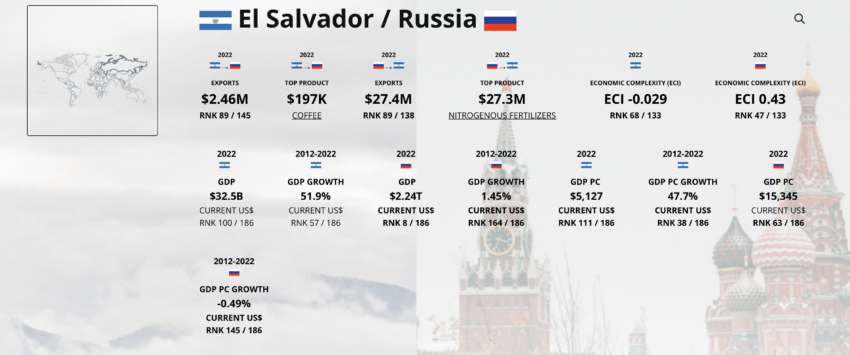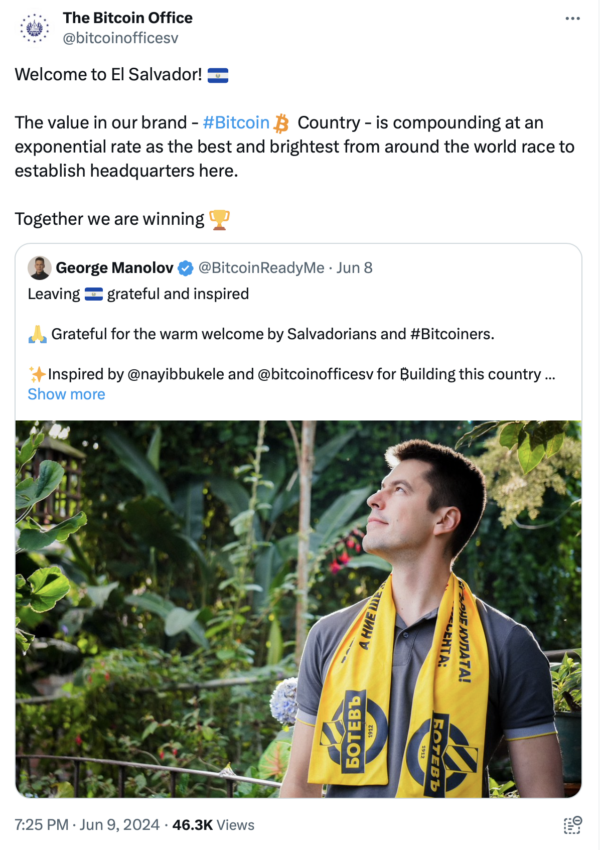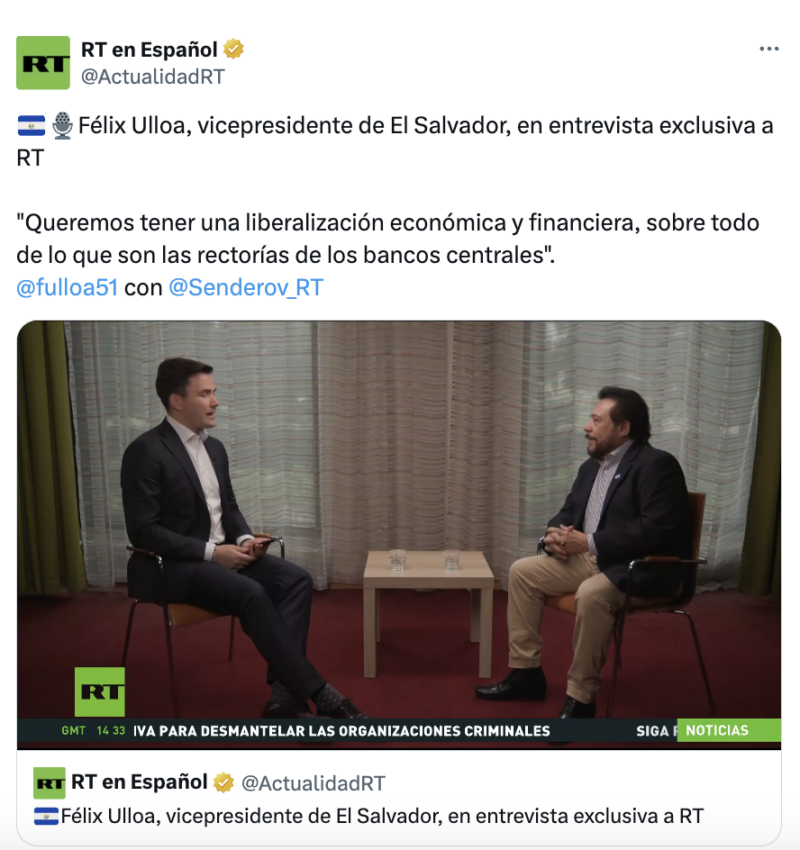ARTICLE AD BOX
BeInCrypto comprehensive Latam Crypto Roundup brings Latin America’s most important news and trends. With reporters in Brazil, Mexico, Argentina, and more, we cover the latest updates and insights from the region’s crypto scene.
This week’s roundup includes stories about Brazil’s Bitcoin Pharaoh, Botev Plovdiv FC’s move to El Salvador to issue tokenized shares, and more.
El Salvador and Russia Strengthen Economic Cooperation: Bitcoin Could Be on the Agenda
El Salvador and Russia unveiled plans for closer economic collaboration at the St. Petersburg International Economic Forum. Salvadoran Vice President Felix Ulloa proposed enhancing trade relations and establishing mutual embassies, potentially reshaping both nations’ economies.
Russia, facing sanctions from the US and the EU since its 2022 invasion of Ukraine, seeks new trade allies. Under President Nayib Bukele, El Salvador has cooled relations with the US while strengthening ties with China.
Geopolitically, an alliance with Russia could enhance El Salvador’s global standing, reducing its dependence on the United States and solidifying relations with emerging powers like China and Russia. Economically, El Salvador aims to balance its trade deficit with Russia, highlighted by Ulloa’s mention of a $16 million import from Russia in 2021 with no corresponding exports.
Read more: Top 3 Methods for Cross-Border Money Transfer Using Crypto
 Trade Scenario Between El Salvador and Russia, According to the Latest Available Data. Source: OEC
Trade Scenario Between El Salvador and Russia, According to the Latest Available Data. Source: OECTechnologically, El Salvador aspires to become a hub of innovation. Collaborations with Russian tech firms could support this ambition. Notably, Bitcoin’s role is crucial in this potential partnership. As the first country to adopt Bitcoin as legal tender, El Salvador’s digital asset laws and possibly creating a Bitcoin bank could facilitate trade with Russia, bypassing traditional fiat currencies controlled by central banks.
This economic cooperation could redefine El Salvador’s position on the global stage, offering new opportunities in trade, technology, and digital finance.
Brazilian ‘Pharaoh of Bitcoins’ to Remain in Prison After Supreme Court Ruling
The Federal Supreme Court (STF) upheld the imprisonment of Glaidson Acácio dos Santos, known as the “Pharaoh of Bitcoins,” on June 11. Santos, accused of running a cryptocurrency scam through Gas Consultoria, was arrested in 2021 during the Federal Police’s Operation Kryptos.
Santos’ defense requested habeas corpus, seeking to convert his imprisonment to house arrest due to alleged psychiatric issues and questioning the Federal Court’s jurisdiction. However, Justice Gilmar Mendes rejected the request. He acknowledged that pyramid schemes typically fall under state jurisdiction but noted that federal courts can intervene when cases involve crimes connected to the National Financial System.
Santos faces multiple charges, including financial pyramiding, fraudulent management, irregular securities issuance, unauthorized operations, and criminal organization. His scheme promised victims monthly returns of 10% on crypto-asset investments.
This decision follows the recent arrest of Cláudio Barbosa, another “Pharaoh of Bitcoins,” for running a pyramid scheme through Trust Investing. On the run since 2022, Barbosa allegedly caused a loss of R$4.1 billion to investors from over 80 countries.
Read more: 15 Most Common Crypto Scams To Look Out For
Bulgarian Soccer Club Botev Plovdiv to Issue Tokenized Shares in El Salvador
Bulgarian soccer club Botev Plovdiv FC has announced plans to transfer its cryptocurrency operations to El Salvador through Bitfinex Securities. The club adopted Bitcoin as a payment method in October 2023. It moved its operations to benefit from El Salvador’s tax incentives and favorable business environment, aiming to access new capital markets.
George Manolov, the club’s Bitcoin strategy leader, revealed that Botev Plovdiv established a financial entity in El Salvador to issue tokenized shares. This initiative allows investors to become co-owners of the club.
Read more: What is Tokenization on Blockchain?
 The Bitcoin Office of El Salvador Confirmed the Arrival of the Club. Source: X/Twitter
The Bitcoin Office of El Salvador Confirmed the Arrival of the Club. Source: X/Twitter“We want Bitcoin to be the main long-term financial strategy for our business. I am here because we want to do a token issuance from El Salvador to accumulate BTC, but also to allow our fans to be part of the process to become a recognized European club. We are working with Bitfinex Securities to democratize the shares, and the investment ticket will be very low. Anyone can become a co-owner,” Manolov explained.
Manolov discussed this new business model at a Bulgarian presentation and will share it at the BTC Prague forum. He explained that tokenization would enable efficient storage, transfer, and management of assets on Bitfinex Securities via the Liquid Network, a Bitcoin sidechain.
Brazil’s Largest Private Bank Expands Access to Bitcoin and Ethereum
Itaú Unibanco, Brazil’s largest private bank, has expanded its cryptocurrency offerings, allowing customers to trade Bitcoin and Ethereum through its digital platform, Íon. With assets exceeding R$2.7 trillion, the bank aims to make access to these top cryptocurrencies more straightforward and secure.
The initiative began gradually at the end of 2023, receiving positive client feedback. In internal surveys, over 90% of users rated their experience as good or great. With a minimum contribution of R$10, all active users on the Íon platform can now trade cryptocurrencies.
“We are very happy with the cryptoassets journey we are building with our customers. Opening trading to all Íon users reflects not only the evolution of our product but also of the entire market,” said Guto Antunes, head of Itaú Digital Assets. He stressed Itaú’s commitment to offering intuitive and secure crypto trading.
Itaú also aims to educate clients about the crypto market, ensuring they make informed investment decisions. This move aligns Itaú with other Brazilian institutions like BTG Pactual and Nubank, which already offer cryptocurrency exposure to their clients.
Read more: Crypto vs. Banking: Which Is a Smarter Choice?
El Salvador Overcame IMF Observations and Reaffirms Bitcoin Agenda
El Salvador’s Vice President Félix Ullóa has reaffirmed the country’s commitment to Bitcoin, aiming for economic liberation from central banks. Since enacting the Law of Digital Assets last year, the nation has embraced various tokens and cryptocurrencies.
Ullóa highlighted El Salvador’s pioneering role in admitting Bitcoin in exchange-traded funds (ETFs) ahead of the US He expressed confidence that Bitcoin could reach $100,000 by the end of 2024.
Despite initial criticism from the International Monetary Fund (IMF) and rating agencies, El Salvador has diversified its financing sources beyond traditional multilateral organizations. This strategy has bolstered the country’s credibility and attracted digital economy companies through a supportive regulatory framework.
Read more: Who Owns the Most Bitcoin in 2024?
 El Salvador’s Vice President Spoke about Bitcoin in Interview. Source: X/Twitter
El Salvador’s Vice President Spoke about Bitcoin in Interview. Source: X/TwitterEl Salvador recently marked three years since adopting Bitcoin as a legal tender. The country has been purchasing one Bitcoin daily, accumulating up to 30 BTC monthly. These investments have yielded over $67 million in unrealized profits.
Notable investors like Cathie Wood, CEO of ARK Invest, believe President Bukele’s Bitcoin strategy could significantly boost the nation’s GDP over the next five years. Ullóa acknowledged that the IMF continues to monitor the Bitcoin Law, highlighting ongoing discussions about the associated risks and benefits.
As the Latin American crypto scene grows, these stories highlight the region’s increasing influence in the global market. From El Salvador’s Bitcoin plans to Brazilian banks’ crypto trading launch, LATAM is positioning itself as a key player in the tech world. Stay tuned for more updates and insights in next week’s roundup.
The post LATAM Crypto Roundup: Itaú Unibanco Launches Cryptocurrency Trading, Bitcoin Pharaoh Remains in Prison, and More appeared first on BeInCrypto.
.png)
 5 months ago
3
5 months ago
3








 English (US)
English (US)